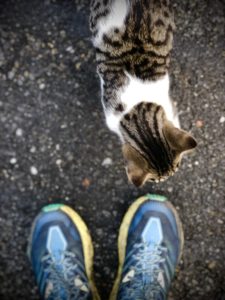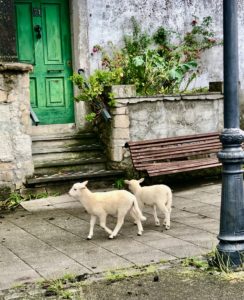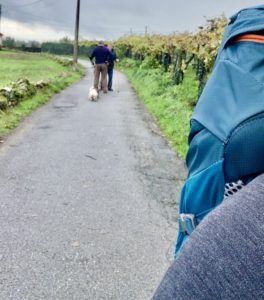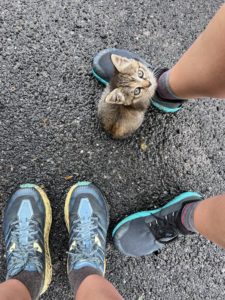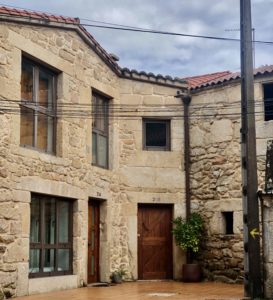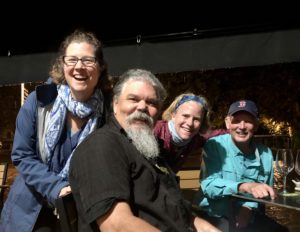SOUL WALK
This will be our second to last day of walking. I struggle to describe how the thought of this being over makes me feel. It is like fresh sadness stretches back in time and forms a braid with all grief that has gone before. This is not what I expected. I thought I would be tired of carrying my house on my back. I thought I would be done with wearing the same two t-shirts on repeat and brushing my teeth with tablets. I thought my body would be fatigued and my mind would be sick of its own thoughts. I thought my squabbling toes would be shouting louder. Instead, I feel deeply sad that my first Camino will soon end. I have found so much spaciousness of spirit out here that living out of a pack feels like I have a mansion to spread out in. I feel there is so much left to explore- inward, upward, outward, forward and back. My heart feels too big for the world I left and yet I have a new sense of my own diminutive place in the history of time. Even as I write them, I feel these words do my emotions little justice.
But, my thoughts have strayed. I let the swell of sadness roll off into the distance as we head out from what we now call, our “hot springs hotel”. A two hour soak in warm, natural spring water last night, has left my muscles tingling with readiness for the twelve miles ahead today.
The Camino de Santiago is the name given to routes that people have been walking to the shrine of St. James in Santiago de Compostela since medieval times. Saint James was the first of Jesus’ twelve apostles to be killed. He was an important biblical character and these days, is considered to be the patron saint of all Spaniards. The story is that, following his execution in Palestine, his disciples retrieved his body and placed it in a stone boat that somehow, made its way across the Mediterranean. It landed in the city of Padrón, where we will arrive this afternoon. His bones were eventually discovered and taken to Santiago de Compostela for burial. The finding of Saint James’ bones inspired a pilgrimage phenomenon that would call thousands of pilgrims from across western Europe to walk hundreds of miles to visit the site each year. These days, Santiago de Compostela is considered to be the third holiest Christian site in the world after Rome and Jerusalem.
There are many loop holes in this story of Saint James. It is a legend peppered with fun details. A stone boat floats safely across the Mediterranean Sea, the bones of a man beheaded in Palestine miraculously appear in a tiny town in Galicia, are discovered by a hermit and yes, scallop shells have inexplicably collected and cling to protect the body. There is also a horse that emerges from the sea but the details of this evade me. Despite questions about the origins of the site, the Camino remains a pilgrimage that draws people from all over the world, all walks if life and all faiths.
The definition of the word, pilgrimage is… “a devotional practice consisting of a prolonged journey toward a specific destination of significance. It is an inherently transient experience, removing the participant from his or her home environment and identity.” A pilgrimage is said to begin the moment you cross the threshold of your front door. I think of the early misty morning ferry rides Emily and I each took from our respective island homes almost a month ago to get to the airport. I think about the threshold I have come here to cross and the devotion with which I now take each step. I feel moved along by the millions of feet that have walked this path before my own- each with their own intention, their own devotion to each step.
In medieval times, pilgrims followed certain traditions and performed specific rituals that enlivened their religious experiences. There is evidence all along The Way that these traditions and rituals are as important to pilgrims now as they were back then. Intimate shrines, delicately towered cairns, small piles of stones and memories hung with color, line The Way. I feel the ghosts of love that hover over these sites. The grace and intention with which each shrine is visited, designed, placed and left saturates this path with a timeless mix of love and faith and grief. I have not been immune to this. So many memories have come to visit and walk with me along The Way but today, maybe because we are drawing so close to Santiago, I feel their presence more.
The outskirts of Caldas de Reis gradually give way to hamlets. Hamlets. The word inspires something countryish, quaint and happy though I am not sure, exactly, of its meaning. So I look it up. “A hamlet is a cluster of houses, smaller than a village, that has no central place of worship.” There is something about these hamlets we walk through this morning that infuse me with a solid sense of place. The stone homes have been here for countless generations and look as immoveable as they probably did when they were first built. Solitary horses tied in lush fields, and small, tidy vineyards characterize this collection of hamlets.
I spot a stone I have been looking for. It’s a palm sized, triangle shaped gray rock with a white wishing stripe. As the end of October grows nearer, I’ve been feeling the presence of my friend, Polly as I often do this time of year. She passed away very reluctantly, on halloween several years ago. As I worry Polly’s wishing rock between my fingers, I tell Emily the story of our long friendship, her super painful death and the horrible aftermath.
We walk along in silence for a while afterward. A winding stream with little waterfalls like leaky eyes, runs repeatedly down the hillside on our left, crying. Polly’s tiny body had fit and grit. She loved to ski and kayak and travel. She was single minded and serious- even obsessive- about her endeavors. She walks along with us for a while through these hamlets. She loves the melding of disciplined routine and athletic adventure that is this walk. She has no trouble keeping up with us in her boots and breeches. I can see her weathered face in old cobbles and hear her kind voice- the wind in trees.
Polly’s visit starts Emily and I on a conversational tour of how families deal with death. She remembers to me, the secret, sacred story of her namesake aunt. We talk about wills and rituals and the whole spectrum of love and evil that shows up when a person passes. It’s a thing. Death is disruptive on a cellular level. It can unearth greed and fear and anger that no one knew was there. Polly’s life and kindness would stay with me forever. The greed and evil I was scarred by, following her death, I will leave here; to be folded away by time, under layers of earth; and washed away by a steady stream of ancient tears.
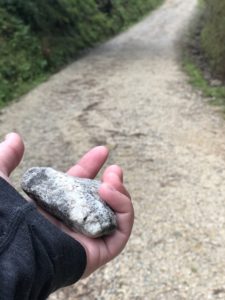
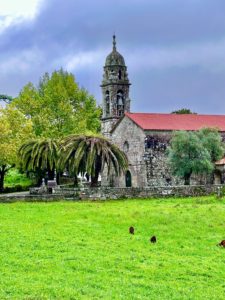
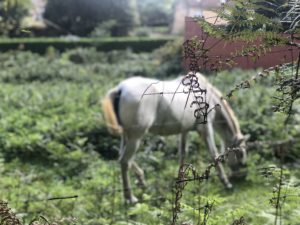
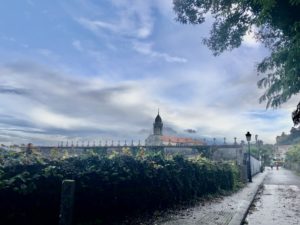
SOMEONE’S HOME
Finding our guest house in Padrón is a bitch. It’s a “casa rural” and is located a couple of kilometers off The Way. We’re excited about it. We’ve been walking feet away from homes and exchanging “Buen Caminos” with locals for weeks. We’ve attempted to learn Spanish phrases, and intersected briefly with people in cafes. We smile sheepishly as we pass through the middle of passionate interchanges between elderly friends in the streets. As pilgrims, we are part of the pilgrim culture and have a place in Spanish culture- we are greeted warmly, provided modern infrastructure over ancient routes and offered special menus in restaurants. We are expected. We are part of the landscape in intimate neighborhoods but have little opportunity for real connection with locals. We crave the opportunity to be in a home; we wonder what’s on the other side of the doors we pass. Tonight’s stay in a “casa rural” may be the closest we get to the invitation we crave.
It’s early afternoon. We diverge from The Way and cradle the outskirts of Padròn. We dawdle with a clingy kitten, visit with wayward lambs and, in the absence of yellow arrows, hope we’re headed in the right direction. The walk gets long. I am glad for Emily’s sense of direction and her phone as I’ve run out of the try needed for navigation. We come across graffiti- “call me by your name and i’ll call you by mine”, written in big green letters on the entrance to an underpass. I am irritated as I try feebly to wrap my brain around the words. What the heck does that mean?? Why did someone waste good spray paint on BS like that? I click a picture of it so I can contemplate it later. Clearly, my tank is close to empty.
Finally, we hit a gradual climb and find ourselves in Lestrobe. I have grown to love these villages that pop up- seemingly in the middle of nowhere. The cobbled streets are lined with what feel like cobbled walls. The stones in this area of Galicia are a particular combination of dusty colors. Muted against the backdrop of vineyard greens, they make the buildings seem older than earth. The entrance to this village is a warm hug after a long day. We pass by address number 88 and shortly spot the open door to our casa rural.
We step inside and wait at the desk. Someone is tinkering in the nearby kitchen. The room is filled with antiques. Relics of old Spain sit on shelves all around. Figurines and elaborate dolls stare at us from living room furniture. Old family photos hang on the walls. We give each other giddy looks. We’re in someone’s home. Finally! Visions of exchanging stories and helping out in that kitchen dance in our heads. It even smells like a family lives here!
We have our passports ready when a thin, spectacled woman bustles from the kitchen to meet us behind the desk. She is warm enough and hands us the key to room two. Wide, open stairs in the middle of the room take us up to a U-shaped landing. There are only enough doors to take up a handful of single digits. So far, we’re the only guests. We rearrange the furniture a bit in our room, unpack and lay some left-over damp clothes out to dry.
I can hear the muffled sounds of neighbors talking over the fence outside our window. Chickens are clucking and strutting in the yard. It feels good to be in someone’s home. I head downstairs to enquire about wine and tapas- maybe we’ll offer to help with dinner!
No one seems to be around but there are noises coming from the kitchen again. I step curiously over the threshold and rubberneck around. The woman that checked us in earlier stands up from behind a counter. In my best spanglish, I ask about wine. It takes a while and several glances at her watch before she nods approvingly and pulls out a bottle of Rioja and a couple of glasses. After pointing to a sign on the wall requesting payment at the time of service she takes my credit card and I take the wine up to our room.
We are hangry. It’s 5:00 and we’re smack in the middle of the dead zone of food availability in Spain. We’d depleted our stockpile of snacks earlier in the day. We are kilometers away from Padrón proper. A sign downstairs says dinner is hours away at 8:30. We decide to go down and see if we can get some food. After more Spanglish and some head shaking and shrugging, we are losing hope. Then Emily remembers her favorite word from a few dinners ago… “azeitonas?!” she says hopefully. Our host’s face lights up and she disappears into the kitchen. She returns with a slightly beat up looking can of green olives. We nod happily, “Yes! Yes! Azeitonas!” Whew. Olives should take the edge off. We sit down at the living room table with what’s left of our wine. The olives appear in a bowl alongside some peanuts in worn looking shells. We eat a couple of olives and shell a couple of nuts. I can see a grimace forming on Emily’s face just as I register how much these olives taste like fish. And how musty these peanuts are. We look at each other- eyes locked in recognition for a second before we burst out laughing. “Let’s get a taxi”, we say at almost the same time.
In Padrón, we locate the only open bar. It is PACKED. Not an empty table in sight. I’m wandering around inside, starving, when I look out over the outdoor seating and see a Boston cap. Mmmm… an American. We get a little closer and realize the hat belongs to David. And there’s Greg! The Asheville boys wave us over and happily make room for us at their table. We order some tapas and start in with stories.
The irony here is not lost on me. This is where we belong at this time, on this journey. We may long for connections to culture we’ve had living abroad in the past, but right now, we are Pilgrims. We are in a buzzing bar, with fellow Pilgrims. Making plans for the next day’s walk. Discussing sore body parts. Sharing songs in the making. Reciting poetry on the run. Delighting in all the places our lives intersect. We are not in someone’s home. We are not learning new words tonight or helping make dinner. But here, for now, we are home.
